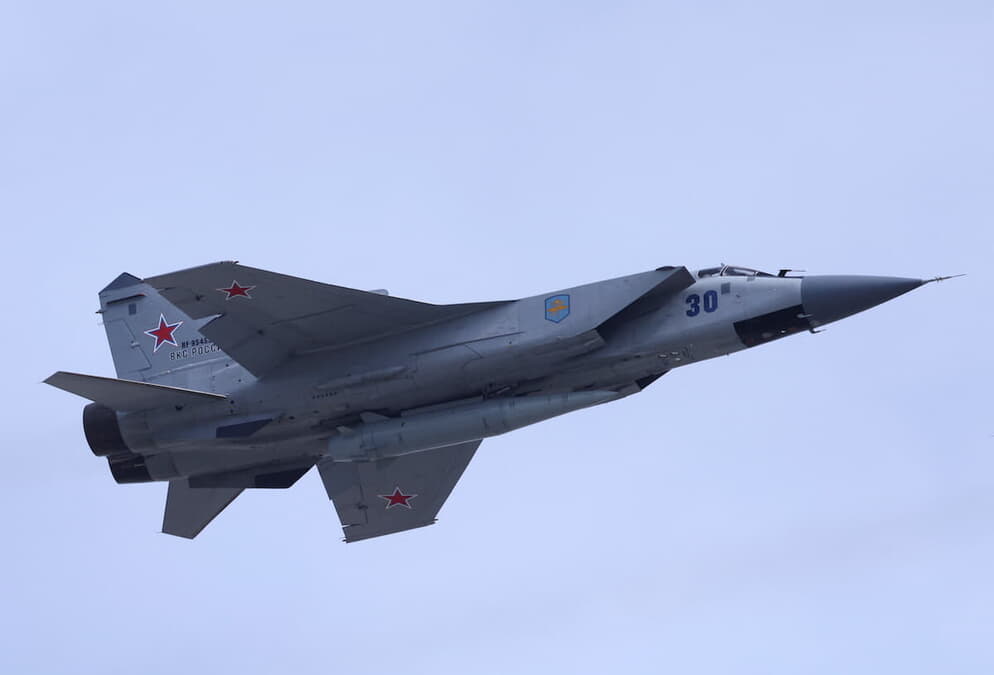The developers of Russia’s hypersonic Kinzhal (Dagger) missile program “deceived” Russian President Vladimir Putin, according to the former chief of Ukraine’s foreign intelligence service.
Mykola Malomuzh, who led Ukraine’s foreign intelligence service until 2010, told Ukrainian media that the developers had touted the missile as a “superweapon,” but that its effectiveness had failed to live up to the hype. Its capabilities have also been questioned by Western analysts.
This comes after the Kremlin said earlier in May that three scientists who worked on the Kinzhal missile system’s development faced “very serious accusations,” but declined to provide further information at the time.
In an open letter published online, the colleagues of Anatoly Maslov, Alexander Shiplyuk and Valery Zvegintsev protested the arrests of “three outstanding aerodynamic scientists.”
The letter from the members of Siberia’s Khristianovich Institute of Theoretical and Applied Mechanics in the city of Novosibirsk said the three men had been arrested on suspicion of high treason. Shiplyuk was arrested in August 2022 and Maslov was detained by Russian authorities back in June, according to Russian state media.
Zvegintsev’s arrest wasn’t previously reported, but took place on April 7, according to Reuters, citing local media.
Separately, Russian physicist Dmitry Kolker, another scientist from Novosibirsk who was arrested in Siberia last summer on treason charges, reportedly died from terminal cancer in Moscow after being transported from his hospital bed by the Russian security service.
“The whole society was shocked and outraged” by his death, the open letter said.
The Kinzhal hypersonic missile system has been touted by Putin as “unrivaled in the world.” Russia has said the air-launched missile, also known by its NATO designation of “Killjoy,” can accelerate to ten times the speed of sound and has a range in excess of 2,000 kilometers, or 1,250 miles. However, Western experts have questioned the Kinzhal’s capabilities, and its designation as a hypersonic weapon.
Earlier this month, Ukraine’s military said it had successfully shot down six Kinzhals fired in an overnight barrage. Kyiv had previously said it had intercepted a Kinzhal using a U.S.-made Patriot air defense system, which Russia denied.
Malomuzh said the scientists were arrested after a Kinzhal strike failed to cause the damage it was expected to.
The Kinzhal’s developers “clearly positioned” the Kinzhal to be a “superweapon that does not exist,” Malomuzh said in an interview published on Monday, adding they “actually deceived Putin.”
Reports of intercepted Kinzhal strikes show the attacks “ended in complete failure,” Malomuzh told Ukrainian outlet TSN. “Therefore, the fate of these Daggers’ developers will also end in complete failure, because they undermined the strategic basis of Russia’s combat capability,” Malomuzh added.
Newsweek has reached out to the Russian Defense Ministry and the Khristianovich Institute for comment via email.
In their open letter, the three scientists’ colleagues said they “know each of them as a patriot and a decent person who is not capable of doing what the investigating authorities suspect them of.”
“We are not only afraid for the fate of our colleagues,” the open letter continued. “We just do not understand how to continue to do our job.”
The Kinzhal was unveiled back in 2018 by Putin as part of a package of advanced weapons, and Russian Defense Minister Sergei Shoigu said in August 2022 that the missile had shown off its “brilliant characteristics” in Ukraine.
A truly hypersonic missile would be very difficult for air defenses to intercept, military expert David Hambling previously told Newsweek, but stressed that “all the indications are the Kinzhal is simply an air-launched ballistic missile” with a limited course-correction capacity.
Source : Newsweek


